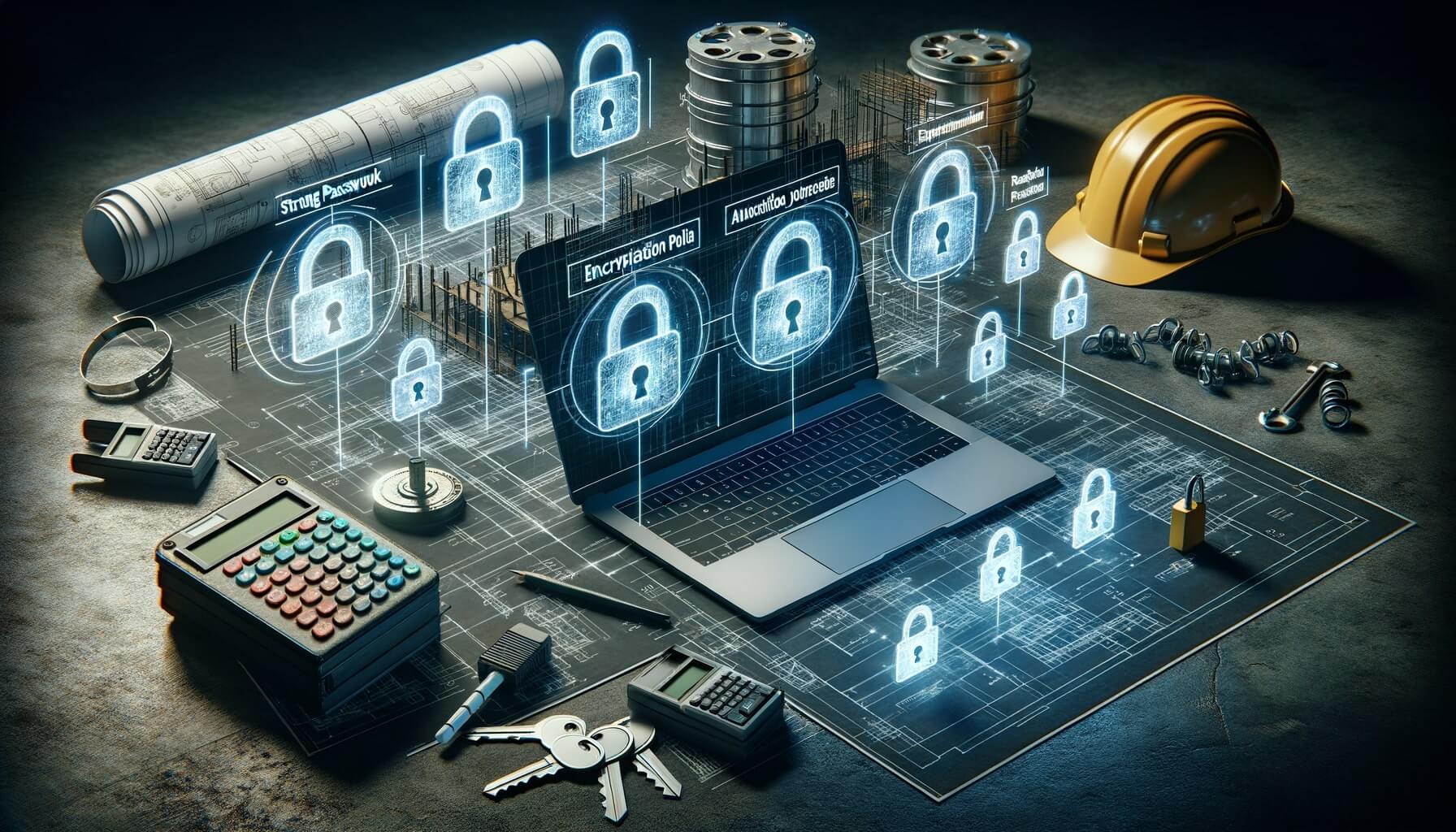
By alphacardprocess February 1, 2025
In today’s digital age, the construction industry is increasingly reliant on technology to streamline operations and improve efficiency. However, with this increased reliance on technology comes the risk of cyber threats and data breaches. Construction companies often handle sensitive client data, including financial information, making them prime targets for cybercriminals.
To combat these threats and protect client data, it is crucial for construction companies to adhere to Payment Card Industry Data Security Standard (PCI DSS) compliance.
Understanding the Importance of Protecting Client Data in Construction
The construction industry handles a vast amount of client data, ranging from personal information to financial details. This data is not only valuable to the construction company but also to cybercriminals who can exploit it for financial gain.
A data breach can have severe consequences for both the construction company and its clients, including financial loss, reputational damage, and legal liabilities. Therefore, protecting client data should be a top priority for construction companies.
The Basics of PCI Compliance: What You Need to Know
PCI compliance refers to the adherence to the PCI DSS, a set of security standards established by major credit card companies to ensure the protection of cardholder data. While PCI compliance is mandatory for businesses that handle credit card transactions, it is equally important for construction companies that process payments from clients using credit cards. By complying with PCI DSS, construction companies can demonstrate their commitment to safeguarding client data and reducing the risk of data breaches.
Implementing PCI DSS Standards in Construction: A Step-by-Step Guide

Implementing PCI DSS standards in the construction industry requires a systematic approach to ensure all necessary security measures are in place. Here is a step-by-step guide to help construction companies achieve PCI compliance:
1. Assess Your Current Security Measures: Begin by conducting a thorough assessment of your current security measures to identify any vulnerabilities or gaps in compliance.
2. Develop a Data Security Policy: Create a comprehensive data security policy that outlines the procedures and protocols for handling client data. This policy should cover areas such as data encryption, access controls, and incident response.
3. Secure Your Network: Implement robust network security measures, including firewalls, intrusion detection systems, and regular network monitoring. Ensure that all network devices are properly configured and regularly updated.
4. Protect Cardholder Data: Implement strong encryption methods to protect cardholder data both in transit and at rest. Use secure payment gateways and tokenization techniques to minimize the storage of sensitive data.
5. Regularly Update and Patch Systems: Keep all software and systems up to date with the latest security patches and updates. Regularly scan for vulnerabilities and promptly address any identified issues.
6. Restrict Access to Cardholder Data: Limit access to cardholder data to only authorized personnel who require it for their job responsibilities. Implement strong authentication measures, such as two-factor authentication, to ensure only authorized individuals can access sensitive data.
7. Monitor and Test Your Security Measures: Regularly monitor and test your security measures to identify any potential weaknesses or vulnerabilities. Conduct penetration testing and vulnerability assessments to ensure your systems are secure.
8. Train Employees on Security Best Practices: Provide comprehensive training to all employees on security best practices, including how to identify and respond to potential security threats. Regularly reinforce this training to ensure ongoing awareness and compliance.
9. Maintain Compliance Documentation: Keep detailed records of all security measures implemented and maintain documentation to demonstrate ongoing compliance with PCI DSS standards.
10. Engage with Qualified Security Assessors: Consider engaging with qualified security assessors to conduct regular audits and assessments of your PCI compliance. These assessments will help identify any areas for improvement and ensure ongoing compliance.
Common Cyber Threats in the Construction Industry and How to Mitigate Them

The construction industry faces various cyber threats that can compromise the security of client data. Understanding these threats and implementing appropriate mitigation strategies is essential for protecting client data. Some common cyber threats in the construction industry include:
1. Phishing Attacks: Phishing attacks involve cybercriminals posing as legitimate entities to trick individuals into revealing sensitive information. Construction companies should educate employees about phishing techniques and implement email filtering systems to detect and block phishing attempts.
2. Ransomware Attacks: Ransomware attacks involve malicious software that encrypts data and demands a ransom for its release. To mitigate this threat, construction companies should regularly back up data, use robust antivirus software, and implement strong access controls to prevent unauthorized access.
3. Insider Threats: Insider threats refer to employees or contractors who intentionally or unintentionally compromise the security of client data. Construction companies should implement strict access controls, conduct background checks on employees, and regularly monitor and audit user activities to detect and prevent insider threats.
4. Weak Passwords: Weak passwords are a common vulnerability that can be exploited by cybercriminals. Construction companies should enforce strong password policies, including the use of complex passwords and regular password changes. Implementing multi-factor authentication can also provide an additional layer of security.
5. Unsecured Wi-Fi Networks: Unsecured Wi-Fi networks can be easily exploited by cybercriminals to intercept sensitive data. Construction companies should secure their Wi-Fi networks with strong encryption, regularly update router firmware, and separate guest networks from internal networks.
Best Practices for Securing Construction Project Data

Securing construction project data goes beyond PCI compliance and requires a comprehensive approach to protect sensitive information. Here are some best practices for securing construction project data:
1. Data Encryption: Implement strong encryption methods to protect project data both in transit and at rest. This includes encrypting data stored on servers, laptops, and mobile devices, as well as data transmitted over networks.
2. Secure File Sharing: Use secure file sharing platforms that provide end-to-end encryption and access controls. Avoid using unsecured email attachments or public file-sharing services that may compromise the security of project data.
3. Regular Data Backups: Regularly back up project data to ensure its availability in the event of a data loss or breach. Store backups in secure offsite locations or use cloud-based backup solutions with strong encryption.
4. Access Controls: Implement strict access controls to limit access to project data to only authorized individuals. Use role-based access controls to ensure that employees only have access to the data necessary for their job responsibilities.
5. Physical Security: Protect physical copies of project data by storing them in locked cabinets or secure offsite storage facilities. Limit access to these physical copies and implement strict controls for their disposal.
6. Vendor Management: Conduct due diligence when selecting vendors and contractors who will have access to project data. Ensure that they have appropriate security measures in place and sign confidentiality agreements to protect the data they handle.
7. Incident Response Plan: Develop an incident response plan that outlines the steps to be taken in the event of a data breach or security incident. This plan should include procedures for notifying affected parties, containing the breach, and restoring the security of project data.
Training and Education: Ensuring PCI Compliance Awareness in Construction

Ensuring PCI compliance awareness among employees is crucial for maintaining a secure environment for client data in the construction industry. Here are some strategies for training and educating employees on PCI compliance:
1. Initial Training: Provide comprehensive training to all employees on the basics of PCI compliance, including the importance of protecting client data and the specific security measures required by PCI DSS.
2. Ongoing Training: Conduct regular training sessions to reinforce PCI compliance awareness and educate employees on emerging cyber threats and best practices for data security. This can be done through workshops, webinars, or online training modules.
3. Security Awareness Programs: Implement security awareness programs that include simulated phishing attacks, interactive quizzes, and educational materials to keep employees engaged and informed about potential security risks.
4. Employee Accountability: Hold employees accountable for their actions by incorporating PCI compliance into performance evaluations and establishing consequences for non-compliance. This will create a culture of responsibility and encourage employees to prioritize data security.
5. Communication Channels: Establish open communication channels for employees to report potential security incidents or raise concerns about data security. Encourage employees to be vigilant and proactive in identifying and reporting any suspicious activities.
PCI Compliance Audits and Assessments for Construction Companies
Regular audits and assessments are essential for construction companies to ensure ongoing PCI compliance. These audits help identify any areas of non-compliance and provide an opportunity to address them promptly. Here are some key aspects of PCI compliance audits and assessments for construction companies:
1. Internal Audits: Conduct regular internal audits to assess the effectiveness of your security measures and identify any areas for improvement. These audits should be conducted by qualified personnel who are knowledgeable about PCI DSS requirements.
2. External Assessments: Engage with qualified security assessors (QSAs) to conduct external assessments of your PCI compliance. QSAs are independent third-party organizations that are authorized to assess compliance with PCI DSS standards.
3. Penetration Testing: Conduct regular penetration testing to identify any vulnerabilities in your systems and networks. Penetration testing involves simulating real-world cyber attacks to assess the effectiveness of your security measures.
4. Vulnerability Scanning: Use automated vulnerability scanning tools to regularly scan your systems and networks for potential weaknesses or vulnerabilities. Address any identified issues promptly to maintain PCI compliance.
5. Remediation Plans: Develop remediation plans to address any areas of non-compliance identified during audits and assessments. These plans should outline the steps to be taken to rectify the issues and ensure ongoing compliance.
Frequently Asked Questions (FAQs)
Q1. What is PCI compliance, and why is it important for construction companies?
A1. PCI compliance refers to the adherence to the PCI DSS, a set of security standards established by major credit card companies to ensure the protection of cardholder data. It is important for construction companies as they handle sensitive client data, including financial information, making them prime targets for cybercriminals. PCI compliance helps construction companies protect client data, reduce the risk of data breaches, and maintain the trust of their clients.
Q2. Is PCI compliance mandatory for construction companies?
A2. While PCI compliance is mandatory for businesses that handle credit card transactions, it is equally important for construction companies that process payments from clients using credit cards. Adhering to PCI DSS standards is crucial for protecting client data and reducing the risk of data breaches.
Q3. What are the consequences of non-compliance with PCI DSS standards?
A3. Non-compliance with PCI DSS standards can have severe consequences for construction companies, including financial loss, reputational damage, and legal liabilities. In addition, non-compliant companies may face fines and penalties imposed by credit card companies.
Q4. How can construction companies ensure ongoing PCI compliance?
A4. Construction companies can ensure ongoing PCI compliance by implementing robust security measures, regularly monitoring and testing their systems, training employees on security best practices, and conducting regular audits and assessments. Engaging with qualified security assessors can also help ensure ongoing compliance.
Conclusion
Protecting client data from cyber threats is of utmost importance in the construction industry. Adhering to PCI compliance standards is crucial for construction companies to safeguard client data, reduce the risk of data breaches, and maintain the trust of their clients.
By implementing robust security measures, regularly monitoring and testing systems, training employees on security best practices, and conducting regular audits and assessments, construction companies can ensure ongoing PCI compliance and create a secure environment for client data. With the increasing prevalence of cyber threats, it is essential for construction companies to prioritize data security and take proactive measures to mitigate risks.